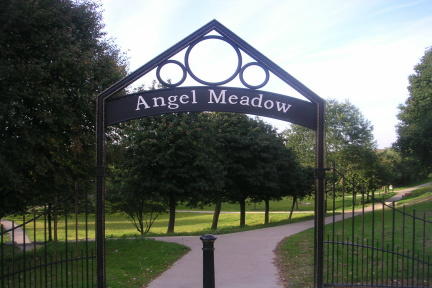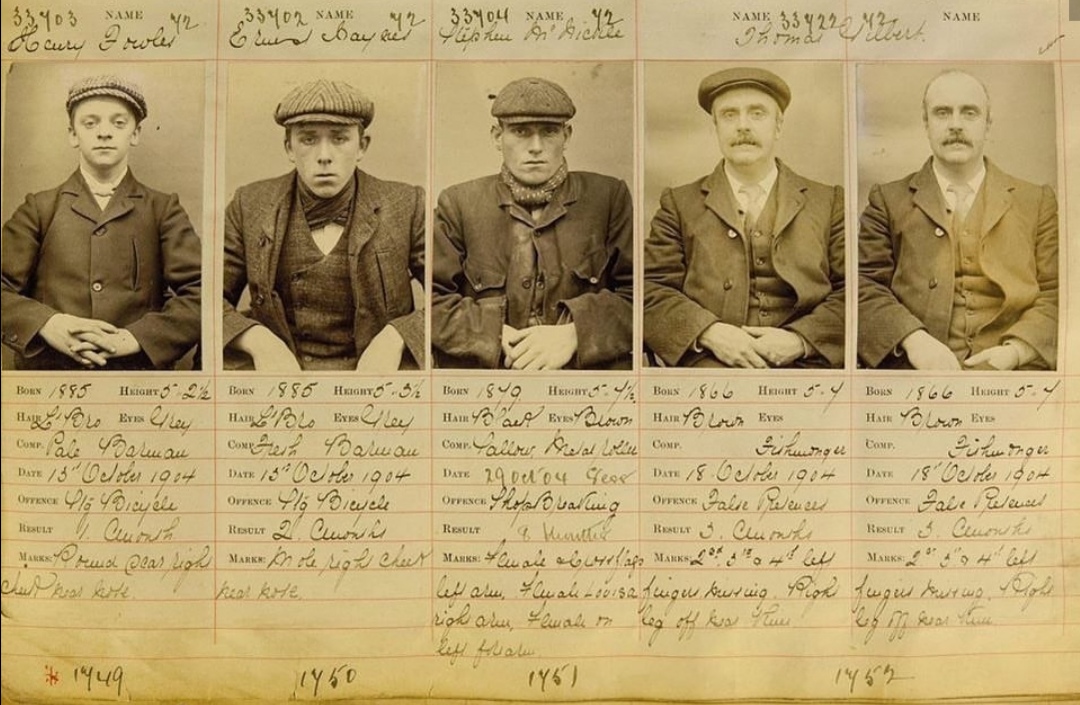|
Scuttlers
Scuttlers were members of neighbourhood-based youth gangs (known as scuttling gangs) formed in working class areas of Manchester, Salford, and the surrounding townships during the late 19th century. It is possible to draw parallels with the London street gangs at the same time period, whose behaviour was labelled hooliganism. The social commentator Alexander Devine attributed the gang culture to lack of parental control, lack of discipline in schools, "base literature" and the monotony of life in Manchester's slums. Gangs were formed throughout the slums of central Manchester, in the townships of Bradford, Gorton and Openshaw to the east and in Salford, to the west of the city. Gang conflicts erupted in Manchester in the early 1870s and went on sporadically for 30 years, declining in frequency and severity by the late 1890s. Dress Scuttlers distinguished themselves from other young men in working-class neighbourhoods by their distinctive clothing. They generally wore a uni ... [...More Info...] [...Related Items...] OR: [Wikipedia] [Google] [Baidu] |
Gangs In Manchester
Gang-related organised crime in the United Kingdom is concentrated around the cities of London, Manchester and Liverpool and regionally across the West Midlands region, south coast and northern England, according to the Serious Organised Crime Agency. With regard to street gangs the cities identified as having the most serious gang problems, which accounted for 65% of firearm homicides in England and Wales, were London, Birmingham, Manchester and Liverpool. Glasgow in Scotland also has a historical gang culture with the city having as many teenage gangs as London, which had six times the population, in 2008. In the early part of the 20th century, the cities of Leeds, Bristol, Bradford, and more prominently Keighley, and Nottingham all commanded headlines pertaining to street gangs and suffered their share of high-profile firearms murders. Sheffield, which has a long history of gangs traced back to the 1920s in the book "The Sheffield Gang Wars", along with Leicester is one of nu ... [...More Info...] [...Related Items...] OR: [Wikipedia] [Google] [Baidu] |
Alexander Devine
Alexander Devine (19 December 1865 — 26 December 1930), often known as Lex Devine, was a British educator and activist for Montenegrin independence. He became involved in social work at an early point, founding the Hugh Oldman Lads' Club Movement in 1887. He was an advocate for public school reform, and, in 1896, founded Clayesmore School in Middlesex. The school would move in 1933 to Dorset due to them purchasing a large plot of land from Thomas Henry Ismay shortly after his Death. He was a special correspondent for the '' Daily Chronicle'' covering the 1906 Summer Olympics in Athens, and the First Balkan War. During the First World War, he organised relief for Montenegro and for Montenegrin refugees, in 1920 serving as Chairman of the British Relief Committee to Montenegro. He had a strong interest in Tribes of Montenegro The tribes of Montenegro (Montenegrin language, Montenegrin and sr-Cyrl-Latn, племена Црне Горе, plemena Crne Gore) or Montenegrin tri ... [...More Info...] [...Related Items...] OR: [Wikipedia] [Google] [Baidu] |
Teddy Boys
The Teddy Boys or Teds were a mainly British youth subculture originating in the early 1950s to mid-1960s and then revived in the 1970s who were interested in rock and roll and R&B music, wearing clothes partly inspired by the styles worn by dandies in the Edwardian period, which Savile Row tailors had attempted to re-introduce in Britain after the Second World War. History A mainly British phenomenon, the Teddy Boy subculture started among teenagers in London in the early 1950s, and rapidly spread across the UK, becoming strongly associated with American rock and roll music. After World War II, male youths in delinquent gangs who had adopted Edwardian-era fashion were sometimes known as ''Cosh Boys'', or ''Edwardians''. The name ''Teddy Boy'' was coined when a 23 September 1953 ''Daily Express'' newspaper report headline shortened ''Edwardian'' to ''Teddy'' (which can be a diminutive form of either Edward or Theodore). Nevertheless, the term had previously been used i ... [...More Info...] [...Related Items...] OR: [Wikipedia] [Google] [Baidu] |
Angel Meadow
St Michael's Flags and Angel Meadow Park is a public park in Manchester, England, to the immediate northeast of the Manchester city centre, city centre, on a slope between the River Irk and Rochdale Road. It occupies an area of acres (3 hectares, ha), and was once an affluent suburb, until the 19th-century Industrial Revolution altered the social standing of the area and introduced poverty and disease. Regeneration of the park in the 2000s has created a gateway into the Irk Valley. History St Michael and All Angels' church was built in 1788 by Humphrey Owen to seat just over a thousand people. Its foundation stone was laid on 20 May 1788 and it was consecrated on 23 July 1789. Almost twenty years later in 1808, a letter appeared in the ''Manchester Guardian'' declaring "Why one of the ugliest churches in Manchester situated in one of the most crowded and notorious parts of the City, should have so long enjoyed the pleasant sounding name 'St Michael's, Angel Meadow' i ... [...More Info...] [...Related Items...] OR: [Wikipedia] [Google] [Baidu] |
Hooliganism
Hooliganism is disruptive or unlawful behavior such as rioting, bullying and vandalism, often in connection with crowds at sporting events. A hooligan is a person that engages in illicit reckless behaviors and is a public nuisance. Etymology There are several theories regarding the origin of the word ''hooliganism,'' which is a derivative of the word wiktionary:hooligan#Noun, hooligan. ''The Compact Oxford English Dictionary'' states that the word may have originated from the surname of a rowdy Irish people, Irish family in a music hall song of the 1890s. Clarence Rook, in his 1899 book ''Hooligan Nights'', wrote that the word came from Patrick Hoolihan (or Hooligan), an Irish Bouncer (doorman), bouncer and thief who lived in London. In 2015, the BBC Scotland TV programme ''The Secret Life of Midges'' noted that the English commander-in-chief during the Jacobite rising of 1745, General Wade, misheard the local Scots Gaelic word for midge—''meanbh-chuileag''—and coined the ... [...More Info...] [...Related Items...] OR: [Wikipedia] [Google] [Baidu] |
Salford Lads' Club
Salford Lads' Club is a recreational club in the Ordsall area of Salford, Greater Manchester, England. The club, on the corner of St. Ignatius Walk and Coronation Street, was established in 1903 as purpose-built club for boys, but today welcomes people of both sexes and organises different activities including sports, and creative and cultural exhibitions. The club also welcomes global visitors for tours on dedicated open days, with merchandise available to purchase to help it remain open. The club was officially opened on 30 January 1904 by Robert Baden-Powell, who later founded the Scout movement. Former members include footballers Albert McPherson, Steve Fleet, Eddie Colman and Brian Doyle, Allan Clarke, lead singer of 1960s pop group The Hollies, and Graham Nash, guitarist, songwriter and singer with The Hollies who went on to form Crosby, Stills, Nash and Young. The building gained listed status in 2003 as its tiled interior is virtually unchanged with original fi ... [...More Info...] [...Related Items...] OR: [Wikipedia] [Google] [Baidu] |
Manchester
Manchester () is a city and the metropolitan borough of Greater Manchester, England. It had an estimated population of in . Greater Manchester is the third-most populous metropolitan area in the United Kingdom, with a population of 2.92 million, and the largest in Northern England. It borders the Cheshire Plain to the south, the Pennines to the north and east, and the neighbouring city of Salford to the west. The city borders the boroughs of Trafford, Metropolitan Borough of Stockport, Stockport, Tameside, Metropolitan Borough of Oldham, Oldham, Metropolitan Borough of Rochdale, Rochdale, Metropolitan Borough of Bury, Bury and City of Salford, Salford. The history of Manchester began with the civilian settlement associated with the Roman fort (''castra'') of Mamucium, ''Mamucium'' or ''Mancunium'', established on a sandstone bluff near the confluence of the rivers River Medlock, Medlock and River Irwell, Irwell. Throughout the Middle Ages, Manchester remained a ma ... [...More Info...] [...Related Items...] OR: [Wikipedia] [Google] [Baidu] |
Subcultures
A subculture is a group of people within a culture, cultural society that differentiates itself from the values of the conservative, standard or dominant culture to which it belongs, often maintaining some of its founding principles. Subcultures develop their own norms and values regarding cultural, political, and sexual matters. Subcultures are part of society while keeping their specific characteristics intact. Examples of subcultures include hippies, Hipster (contemporary subculture), hipsters (which include Hipster (1940s subculture), 1940s original parent subculture), Goth subculture, goths, steampunks, Motorcycle club, bikers, Punk subculture, punks, skinheads, gopnik, Hip hop culture, hip-hoppers, Heavy metal subculture, metalheads, cosplayers, otaku, otherkin, Furry fandom, furries, Hacker culture, hackers and more. The concept of subcultures was developed in sociology and cultural studies. Subcultures differ from countercultures. Definitions The ''Oxford English Dictiona ... [...More Info...] [...Related Items...] OR: [Wikipedia] [Google] [Baidu] |
History Of Greater Manchester
Greater Manchester is a ceremonial county in North West England. It borders Lancashire to the north, Derbyshire and West Yorkshire to the east, Cheshire to the south, and Merseyside to the west. Its largest settlement is the city of Manchester. The county has an area of and is highly urbanised, with a population of 2.9 million. The majority of the county's settlements are part of the Greater Manchester Built-up Area, which extends into Cheshire and Merseyside and is the second most populous urban area in the UK. The city of Manchester is the largest settlement. Other large settlements are Altrincham, Bolton, Rochdale, Sale, Salford, Stockport and Wigan. Greater Manchester contains ten metropolitan boroughs: Manchester, Salford, Bolton, Bury, Oldham, Rochdale, Stockport, Tameside, Trafford and Wigan, the councils of which collaborate through Greater Manchester Combined Authority. The county was created on 1 April 1974 from parts of north-east Cheshire, south-east Lancashire, ... [...More Info...] [...Related Items...] OR: [Wikipedia] [Google] [Baidu] |
County Borough Of Salford
Salford was, from 1844 to 1974, a local authority district, local government district in the county of Lancashire in the northwest of England, covering the city of Salford, Greater Manchester, Salford. It was granted City status in the United Kingdom, city status in 1926. History Free Borough and Police Commissioners In about 1230, the vill of Salford, Lancashire, was created a free borough by charter granted by Ranulph de Blondeville, 4th Earl of Chester. The borough's government was in the hands of a Reeve (England), borough-reeve and portmote court. The reeve was elected by the burgesses at large, while the head of the Molyneux family of Sefton presided over the court as hereditary steward of the Salford (hundred), Hundred of Salford. The first modern local government was established in the area when the Manchester and Salford Police Act 1792 (32 Geo. 3. c. 69) created commissioners to administer the two towns. In 1843 the inhabitant householders petitioned the Privy Counc ... [...More Info...] [...Related Items...] OR: [Wikipedia] [Google] [Baidu] |
Peaky Blinders
The Peaky Blinders were a street gang based in Birmingham, England, which operated from the 1880s until the 1920s. The group consisted largely of young criminals from lower- to working-class backgrounds. They engaged in robbery, violence, racketeering, illegal bookmaking, and control of gambling. Members wore signature outfits that typically included tailored jackets, lapelled overcoats, buttoned waistcoats, silk scarves, Bell-bottoms, bell-bottom trousers, leather boots, and flat caps. Contrary to the television series of the same name, it is unlikely that they had razor blades sewn into these caps, instead gaining their name from the way they wore them with the cap tilted so that the peak covered one eye. The Blinders' dominance came about from beating rivals, including the "Sloggers", "a pugilistic term for someone who could strike a heavy blow in the ring", whom they fought for territory in Birmingham and its surrounding districts. They held "control" for 30 years until 1920 ... [...More Info...] [...Related Items...] OR: [Wikipedia] [Google] [Baidu] |







